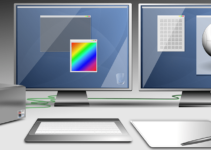When it comes to home cinema, there are two main options when it comes to your projection surface: projector paint or a projector screen. Both have their own advantages and disadvantages, so how do you decide which is best for you? In this article, we will take a look at both options and help you decide which is the best option for your needs.
Projector Screen vs Painted Wall

Projector paint is a popular option for those who want a DIY projector screen. It is relatively inexpensive and easy to apply, and it can be done in any color that you want. However, there are some drawbacks to using projector paint. First, it is not as durable as a projector screen, so it may need to be replaced more often. Second, it can be difficult to get a perfectly flat surface with projector paint, so you may see some wrinkles or waves in your image.
A projector screen is the other popular option for home cinema projection. Projector screens are available in a variety of sizes and materials, so you can find one that fits your needs. They are also more durable than projector paint, so you won’t need to replace them as often. However, projector screens can be more expensive than projector paint, and they may require professional installation.
So which is best for you? If you want a DIY solution that is relatively inexpensive and easy to apply, then projector paint is a good option. However, if you want a more durable solution that will give you a perfect image, then a projector screen is the better choice. Whichever option you choose, make sure to do your research and find the best solution for your needs.
What type of paint to use for projector screen

There are a few different types of paint that can be used for a projector screen. Some people prefer to use regular latex paint, while others prefer specialized projector screen paint. There are pros and cons to both types of paint, so it’s important to do some research to find the best option for your needs.
Regular latex paint is typically less expensive than projector screen paint, but it is not as durable and may need to be replaced more often.
Projector screen paint is more expensive, but it is specifically designed for use with projectors and will give you a better image quality.
Whichever type of paint you choose, make sure to apply it evenly and smoothly for the best results.
Which projector paint is best to choose
- Screen Goo is a popular option because it is easy to apply and gives a good image quality;
- Paint On Screen is another popular choice because it is less expensive than some other brands;
- Elite Screens Projector Paint is a good option if you want a durable paint that will last for many years.
Whichever brand you choose, make sure to follow the instructions carefully to get the best results.
How to paint a projector screen on the wall
- First, make sure that the wall is clean and smooth. Any bumps or imperfections will show up in your image, so it’s important to start with a clean surface;
- Second, choose a light-colored paint for the best results. Dark colors can absorb light and make your image appear dim;
- Third, use a paint roller to apply the paint evenly for best results. Once you’ve finished painting, let the screen dry completely before using it.
Following these tips will help you get the best possible image quality from your projector screen.
Do projector screens make a difference

Yes, projector screens can make a difference in the quality of your image. A projector screen is specifically designed to give you the best possible image quality, so it’s worth the investment if you’re serious about getting a great home cinema experience. Projector screens are available in a variety of sizes and materials, so you can find one that fits your needs. They are also more durable than projector paint, so you won’t need to replace them as often. However, you can find the projector screens more expensive than projector paint, and they may require some pro or semi pro installation.
Which screen color is best for projector
- White screens reflect more light, which can give you a brighter image. However, they can also cause glare and wash out the colors in your image.
- Gray screens don’t reflect as much light, so they won’t be as bright. However, they can help to reduce glare and improve contrast.
- Silver screens are a good middle ground between white and gray screens. They reflect enough light to be bright, but they don’t cause as much glare as white screens.
- Black screens absorb light, so they won’t be as bright as white or gray screens. However, they can give you the best possible contrast and image quality.
- An exta color is the Yellow screens are the least popular option, but they can help to improve contrast in dark rooms.
There is no right or wrong answer when it comes to choosing a screen color for your projector. It’s important to experiment with different colors to see what looks best in your home cinema setup.
How much does a projector screen cost
Prices for projector screens can vary depending on the size and material. You can find small screens for around $100, but prices go up from there. Larger screens and those made from higher-quality materials can cost upwards of $1000. However, it’s important to keep in mind that a projector screen is a long-term investment. It’s something that you’ll use for years, so it’s worth spending the extra money to get a screen that will give you the best possible image quality.
We have great new article about best projector screens for daylight viewing (bright rooms).
- Elite Screens Yard Master Series;
- VEVOR Projector Screen.
- Da-Lite Fast-Fold Deluxe Screen;
These are all great options, but there are plenty of other projector screens on the market. Do some research to find the best screen for your home cinema setup.
Projector Screen Paint vs White Wall
There are a few things to consider when deciding between projector screen paint and a white wall. The first is image quality. A projector screen is specifically designed to give you the best possible image quality, so it’s worth the investment if you’re serious about getting a great home cinema experience. However, projector screen paint can also give you a good image quality if you follow the proper steps.
The second thing to consider is cost. Projector screens can be more expensive than projector screen paint, but they are also more durable and require less maintenance. If you’re on a budget, projector screen paint is a good option. However, if you’re willing to spend more money, a projector screen is a better investment.
The third thing to consider is installation. Projector screens can be more difficult to install than projector screen paint, so you may need to hire a professional or semi-pro installer. However, once they’re installed, they’re much easier to use and maintain.
No matter what your budget or needs are, there’s an option out there for you. It’s important to do your research and decide what’s best for your home cinema setup.
If you have any questions about projector paint or projector screens, please feel free to contact us. We’re always happy to help!






